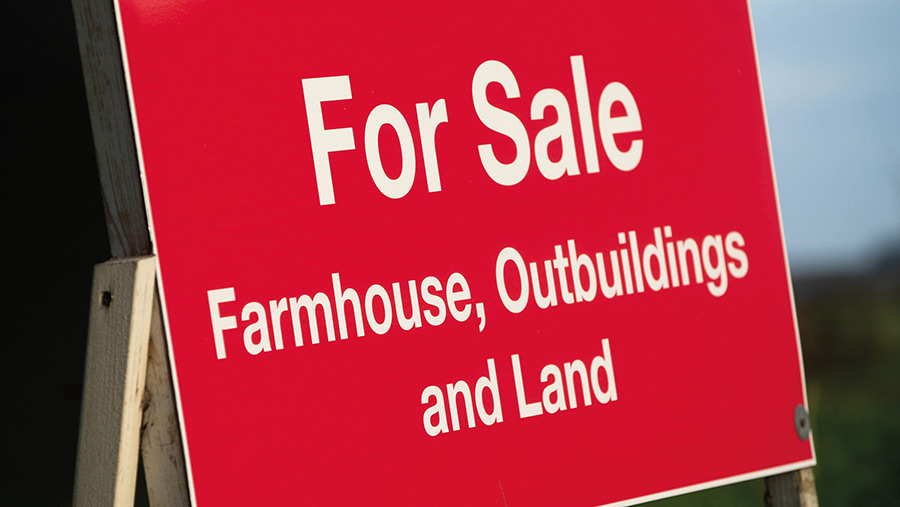So you want to… Buy a farm?
 © Tim Scrivener
© Tim Scrivener Buying a farm is a once-in-a-lifetime opportunity that can bring a host of questions and conundrums.
With so much at stake, getting the right farm, at the right price, at the right time, is crucial.
Matthew Sudlow, head of estates and farm agency at Strutt & Parker, provides some tips.
See also: Revealed: The UK’s most expensive farm sales
How to start?
It is important to be clear about your objectives before you start looking for a farm.
Sit down with your family and other stakeholders to agree what your priorities should be, including search areas.
Involving a third party in these discussions can be helpful. They can be impartial and may contribute ideas that change or refine requirements.
Where to look?
The internet may be the first port of call for people looking for residential property, but when it comes to buying land and farms, what is advertised online is not the whole story.
Private sales may account for 20-25% of the market, so talking to agents is also vital.
An experienced agent should be able to talk to you about what land is available off market and point towards farms that might be coming forward in the next six months.
When to look?
Spring and early summer, when farms look their best, is when most farms are traditionally launched.
However, over the past few years the market has become a little less seasonal, with more transactions taking place in the second half of the year.
How long does it take?
The number of farms that come to the market each year is relatively small, so searching can take time.
It is not unusual for a buyer to be in the market for two or three years before making a purchase.
The minimum time it takes to find and buy a farm is about six months.
Buyers with capital gains tax rollover money have three years to reinvest their cash. If they are unable to secure a farm within this time, HMRC may grant an extension in exceptional circumstances.
The role of a buying agent
The majority of agents don’t just sell land – they will also act as a buying agent if required. This means they are retained to represent the buyer, aiming to smooth the process.
A buying agent may help search for the right farm; advise on technical aspects of a farm’s potential, including drawing up budgets; value the property; and lead sale negotiations.
Once an offer has been accepted, they can work with the other professionals involved – such as lawyers and accountants – to carry out due diligence checks and get the deal finalised.
Some buyers want lots of help, while others only want input at certain stages.
Agents typically charge a small percentage of the purchase price or have a fixed fee arrangement.
Tips for viewings
Most buyers want at least two viewings of a property before considering making an offer.
Don’t be afraid to ask awkward questions or, if you aren’t comfortable doing this, get your agent to do it.
This can uncover, for example, if the heap of rubble at the back of the yard includes asbestos that will need disposing, or if ditches full of water point to drainage problems.
Take photographs of anything you are worried about so you can investigate it further.
Buyers can make the most of a first viewing by researching the property online first. The interactive Magic map, managed by Natural England, can help identify land designations and rights of way.
Before making an offer
With land values highly polarised – arable values in England ranged from a high of £17,500/acre to a low of £5,200/acre during the first half of 2020 – doing your research is crucial.
Values can vary widely within counties and even within parishes, so you’ll need detailed knowledge of the local market before making an offer.
There’s a huge range of considerations to factor in, including what the soil is capable of producing; any planning restrictions; if the land is in an Area of Outstanding Natural Beauty or includes a site of special scientific interest; if it floods; or if the farm has been zoned for development.
Prove yourself
Relatively early in the process, buyers will be asked to prove they have the financial resources to support a purchase. Expect to be asked to provide a financial reference from either your bank manager or accountant.
Anti-money laundering and counter-terrorist financing legislation was strengthened in 2017, requiring much more stringent checks on buyers.
Buyers will need to show proof of identity and proof of residence. If buying through a company or trust structure, both the buying agent and selling agent will need to know all the stakeholders and beneficiaries.
Stamp duty
Stamp duty land tax varies according to the purchase price and property, but the majority of farms usually fall under the “mixed use” classification, with a top rate of 5% (compared with 12% for residential property).
